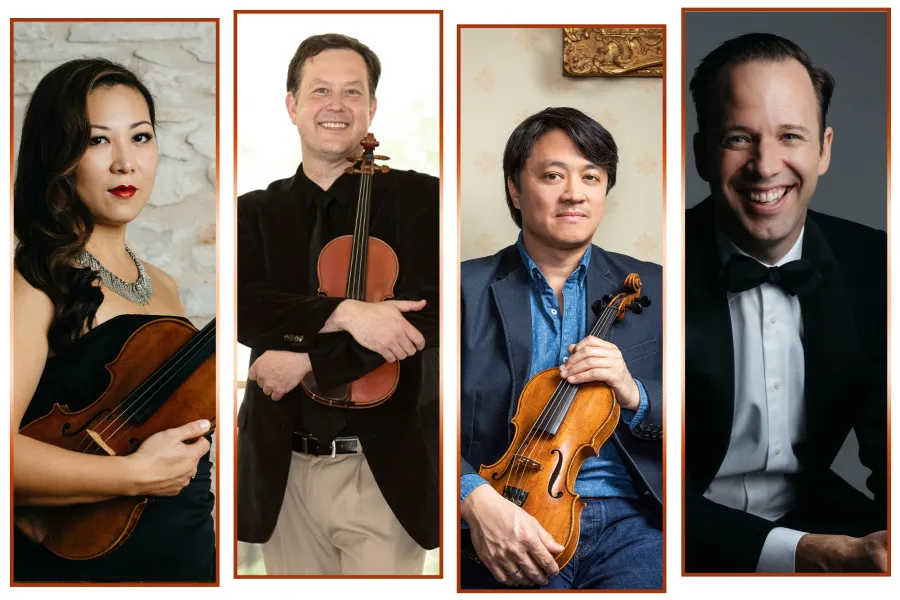
Farkhad Khudyev, music director & conductor
FEATUIRED VIOLINISTS
Sandy Yamamoto
Brian Lewis
Daniel Ching
William Fedkenheuer
This concert will last approximately 60 minutes with one intermission.
Program
Yevgeniy Sharlat
Capriccio for Four Violins and Orchestra texas premiere
Allegro Ma non troppo
Adagio
Rondo
Sandy Yamamoto, violin
Brian Lewis, violin
Daniel Ching, violin
William Fedkenheuer, violin
Omar Thomas trans. Nicholas Urie
Come Sunday world premiere (transcription)
Testimony
Shout!
Intermission
Pietro Mascagni
Intermezzo from Cavalleria rusticana
Zoltán Kodály
Dances of Galánta
Lento
Allegretto moderato
Allegro con moto, grazioso
Allegro
Allegro Vivace
About the Program
Program Notes by Mark Bilyeu, except Come Sunday by Penny Brandt.
Yevgeniy Sharlat
Capriccio for Four Violins and Orchestra
BORN 1977, Moscow, Russia
COMPOSED 2010
PREMIERED September 13, 2010 in Riga, Latvia, Ainars Rubikis, conductor
DURATION 12 minutes
Composer Yevgeniy Sharlat describes himself as “a Russian Jewish musician keeping it weird in Austin. As a composer, I am very interested in human communication through sound and movement. As a teacher, I strive to break down barriers.” Born in Moscow, Russia, Mr. Sharlat came to the United States as a refugee at age 16. He studied composition at the Curtis Institute of Music, and Yale University, and since 2005, has been on the composition faculty at The University of Texas at Austin. Mr. Sharlat is a 2020 John Simon Guggenheim Fellow; whose other honors include the 2006 Charles Ives Fellowship from American Academy of Arts and Letters, a Fromm Music Foundation Commission. His 2010 work Capriccio was written for the Kremerata Baltica, and is based on material inspired by J.S. Bach’s English Suite, BWV 807, for harpsichord. In 2018, Sharlat crafted an updated version, premiered by Ensemble Quodlibet, which included the harpsichord.
Omar Thomas
Come Sunday
BORN 1984, Brooklyn, New York
COMPOSED 2018
PREMIERED November 15, 2018, Illinois State University Wind Symphony
DURATION 11 minutes
Omar Thomas is an American educator, arranger, and composer. Born to Guyanese parents in New York, Thomas was appointed Assistant Professor of Harmony at Berkeley College of Music while studying there at the age of twenty-three and he is currently Assistant Professor of Composition at the University of Texas at Austin. His music has been performed around the world, won numerous awards, and appeared on the Billboard Jazz Charts. Come Sunday was commissioned by a consortium that includes the University of Texas at Austin and is led by the Illinois State University Wind Symphony. The composer writes:
Come Sunday is a two-movement tribute to the Hammond organ’s central role in black worship services. The first movement, Testimony, follows the Hammond organ as it readies the congregation’s hearts, minds, and spirits to receive the word via a magical union of Bach, blues, jazz, and R&B. The second movement, Shout!, is a virtuosic celebration — the frenzied and joyous climactic moments when The Spirit has taken over the service. The title is a direct nod to Duke Ellington, who held an inspired love for classical music and allowed it to influence his own work in a multitude of ways. To all the black musicians in wind ensemble who were given opportunity after opportunity to celebrate everyone else’s music but our own — I see you and I am you. This one’s for the culture!
Pietro Mascagni
Intermezzo from Cavalleria rusticana
BORN December 7, 1863, Livorno, Italy
DIED August 2, 1945, Rome, Italy
COMPOSED 1888
PREMIERED May 17, 1890, Teatro Costanzi, Rome, Italy
DURATION 4 minutes
During the reign of Giuseppe Verdi as the king of Italian opera: grand operas that told stories of high-profile characters and Shakespearean tragedies, a young conductor and composer named Pietro Mascagni was being drawn to the verismo movement. This school brought the spotlight away from kings, queens, and mythological figures, and focused on the average, contemporary struggles of average, contemporary people (Leoncavallo’s opera Pagliacci about a circus clown is perhaps the most vivid example of verismo storytelling, and this annotator recommends S4 E9 of Seinfeld for the fullest verismo experience). Mascagni entered an 1888 competition to write a new one-act opera, using a libretto he commissioned by Giovanni Targioni-Tozzetti and Guido Menasci inspired by the play Cavalleria rusticana (Country Chivalry) by Giovanni Verga. The 27 year-old Mascagni, beating out 72 other entries, was awarded first place, and his opera Cavalleria rusticana became an instant hit. The short two-scene work tells the story of the young peasant Turiddu, who has seduced (and then abandoned) Santuzza, choosing instead the married Lola. The intermezzo, played between scenes with a raised curtain, depicts the quiet Easter Sunday in the Sicillian town where the opera takes place. Based on the hymn tune heard earlier in the village church, the intermezzo has become Mascagni’s calling card, not only within opera audiences, but having been used in Martin Scorse’s Raging Bull, Francis Ford Coppola’s The Godfather, Part III, and even — as an hommage to Santuzza — in the HBO series The Sopranos.
Zoltán Kodály
Dances of Galanta
BORN December 16, 1882, Kecskemét, Hungary
DIED March 6, 1967, Budapest, Hungary
COMPOSED 1933
DURATION 15 minutes
Galanta, a town along the railroad that connected Budapest and Vienna in modern-day Slokavia, was the childhood home of Zoltán Kodály, whose father was the stationmaster of the town. At this crossroads, the young Zoltán was exposed to the rich musical sononorites of the music of the Romani people, as he accounted (in the third person) “At that time there existed a famous [Romani] band...This was the first ‘orchestral’ sonority that came to the ears of the child.” These timbres — rich with violins, double basses, clarinets, a piano, accordion, panflute, and often a hammered string instrument — stayed with the young musician throughout his education which took him to Budapest and Paris. Kodály went on to be a leading figure in what is now known as ethnomusicology, traveling throughout some of the most remote parts of Hungary to record the music of those who lived there. He based much of his music on music he encountered throughout his studies (and it would be an oversimplification to say that Kodály’s art music was simply “artistic arrangements” of these melodies), and when commissioned by the Budapest Philharmonic Society to celebrate their 80th anniversary, he turned to an anthology of Hungarian folk songs published a century earlier. The five dances, presented without interruption, offer an array of Hungarian landscapes: from a band of street performers in the village to idyllic countrysides, and from military recruitment dances (yes, there was such a thing), to the sound of a lone clarinetist on a street corner.
About the Artists
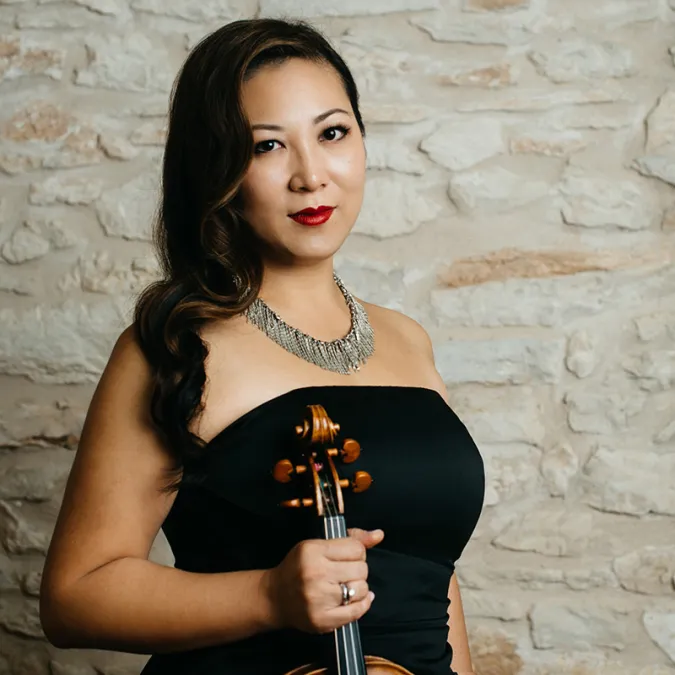
Sandy Yamamoto
Violinist Sandy Yamamoto has dazzled audiences in concert performances around the globe for the past three decades as a soloist and as a member of the Miró Quartet. With the Miró Quartet, she performed on the major concert stages of the world, regularly concertizing in North America, South America, Europe and Asia. As a member of the Quartet, she was a recipient of the Naumburg Chamber Music and Cleveland Quartet Awards, won First Prize at the Banff International String Quartet Competition and was one of the first chamber musicians to be awarded an Avery Fisher Career Grant. Since leaving the Quartet in May 2011, she has been appointed Associate Professor of Practice in Violin Performance at the Butler School of Music. She also founded the Butler Trio with cellist Joshua Gindele and pianist Colette Valentine. In 2016, she was the recipient of the Butler School of Music Teaching Excellence Award.
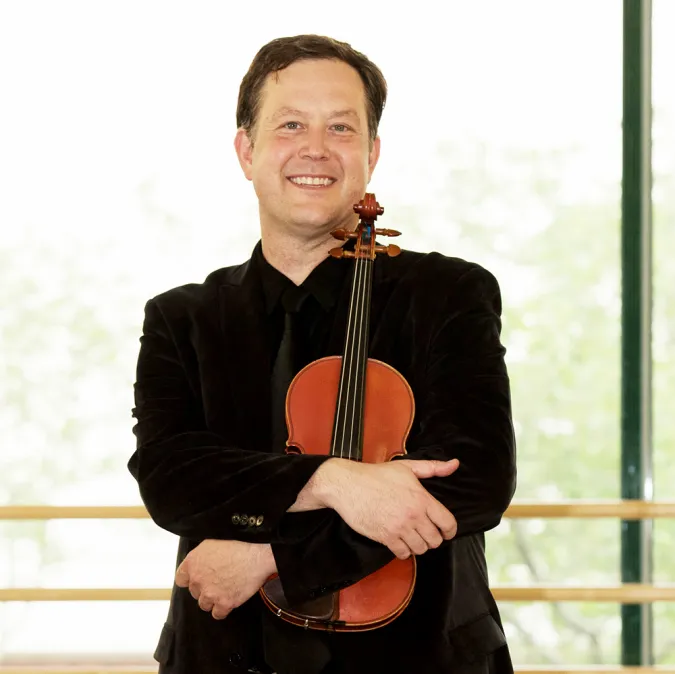
Brian Lewis
“There are a lot of fine violinists on the concert stage today, but few can match Lewis for an honest virtuosity that supremely serves the music,” reports the Topeka Capital-Journal. Acclaimed performances include concerto debuts in both New York’s Carnegie Hall and Avery Fisher Hall, among many others. Awards for his musical contributions include the Instrumentalist Award by the 2014 Austin Critics’ Table, two Teaching Excellence Awards at the University of Texas, ING Professor of Excellence Award, Medal of St. Barthélemy (French West Indies), Texas Exes Teaching Award, Fredell Lack Award, Peter Mennin Prize, William Schuman Prize, Waldo Mayo Talent Award, and two Elizabeth B. Koch fellowships. He is also the artistic Director of the Starling-DeLay Symposium on Violin Studies at The Juilliard School in New York City.
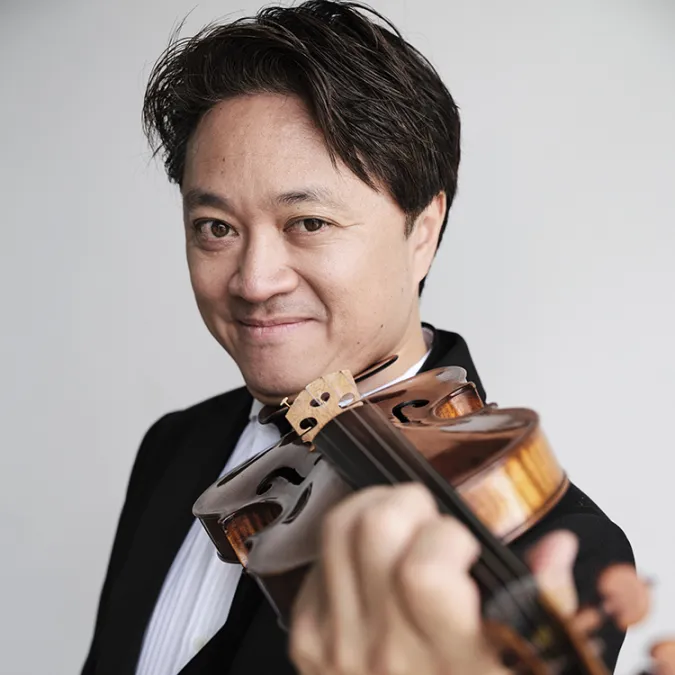
Daniel Ching
Daniel Ching, a founding member of the Miró Quartet, began his violin studies at the age of 3 under tutelage of his father. At age 5, he entered the San Francisco Conservatory Preparatory Division on a full twelve-year scholarship, where he studied violin with Serban Rusu and Zaven Melikian, and chamber music with Susan Bates. At the age of 10, Daniel was first introduced to string quartets.A graduate of the Oberlin Conservatory of Music, Daniel studied violin with Kathleen Winkler, Roland and Almita Vamos, and conducting with Robert Spano and Peter Jaffe. He completed his Masters degree at the Cleveland Institute of Music, where he studied with former Cleveland Quartet violinist Donald Weilerstein. He also studied recording engineering and production with Thomas Knab of Telarc, and subsequently engineered the Miró Quartet’s first promotional disc. Daniel is on faculty at the Sarah and Ernest Butler School of Music at the University of Texas at Austin, where he teaches private violin students and coaches chamber music. He concurrently maintains an active international touring schedule as a member of the Miró Quartet.
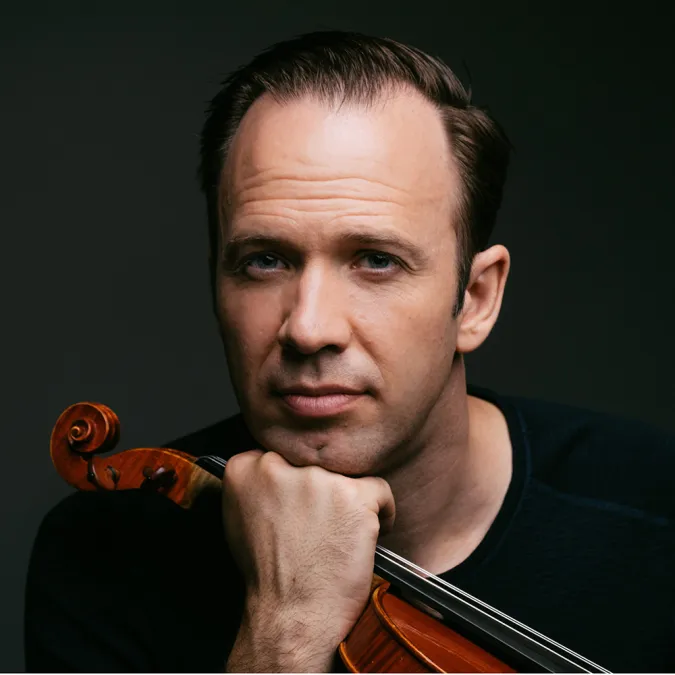
William Fedkenheuer
William Fedkenheuer, widely respected for his roles as a performer, teacher, coach, and consultant, leverages over two decades of experience both on and off stage as a member of three internationally renowned string quartets (Miró, Fry Street, Borromeo). Growing up in Calgary, Alberta, Canada, he claimed the title of Canadian National Fiddle Champion in 1989 before debuting as a soloist with the Calgary Philharmonic in 1994. Prestigious performance venues include Carnegie Hall, Esterhazy Castle, and Suntory Hall and his performances extend to global platforms, including NPR, PBS, NHK, and the Discovery Channel, as well as publications such as Strings and Strad magazines. William is also active as a consultant and professional development coach, drawing on a quarter-century of experience in the music industry and his unique set of tools. Married to violist Leah Nelson, William shares his passion for curiosity, hiking, burgers and chocolate with his two sons, Max and Olli. For further details, visit williamfed.com.
Farkhad Khudyev
Farkhad Khudyev is the winner of the Gold Medal “Beethoven 250” at the 1st International Arthur Nikisch Conducting Competition; the Solti Foundation US 2018 and 2022 Career Assistance Award; the Best Interpretation Prize at the 1st International Taipei Conducting Competition; the 3rd prize at the 8th International Sir Georg Solti Conducting Competition; and the Gold Medal/Grand Prize at the 2007 National Fischoff Competition. Khudyev has worked with orchestras worldwide including the London Philharmonic Orchestra, Frankfurt Radio Symphony Orchestra, Frankfurt Opera Orchestra, Danish National Symphony Orchestra, Seattle Symphony, Dallas Symphony, Los Angeles Philharmonic, San Diego Symphony, Monterey Symphony, George Enescu Philharmonic Orchestra, Xi’an Symphony Orchestra and the State Taipei Chinese Orchestra. Farkhad was born in Turkmenistan, where he studied at the State Music School for gifted musicians, and then completed his studies at Interlochen Arts Academy, Oberlin Conservatory and Yale University. Khudyev serves as the Music Director of the University of Texas Symphony Orchestra in Austin, and the Orchestral Institute at the Hidden Valley Institute of the Arts in Carmel, California.
Symphony Orchestra
VIOLIN 1
Mei Liu, concertmaster
Benjamin Kronk
Ellie Sievers
Han Na Lee
Bella Benrubi
Kyle Adams
Misa Stanton
Na-Yeon Kim
Oliver Fiorello
Tina Zhao
Jackie Shim
Suhaas Patil
Brandon Garza
VIOLIN 2
Yebeen Seo
Zichuan Wang
Leah Streety
Sui Shimokawa
Danielle Najarian
Suhyun Lim
Thomas Gougeon
Noah Briones
Lamu Zhaxi
Ivan Arras
Chloe Yofan
Jimmy Shim
VIOLA
Jason Lan, principal
Anahit Matevosyan
Emily Whitney
Emmanuel Aguilera
Casey Boyer
Christine Le
Gwanji Lee
Dean Roberts
Kendall Weaver
CELLO
Katsuaki Arakawa, principal
Aili Kangasniemi
Tsz To Wong
Madison Garrett
Je-Shiuan Hsu
Yilin (Selina) Xu
River Maxfield
Mika Syms
Nicole Parker
Daniel Meglino
Javy Liu
Saava Wagner
Melody Lihou
Johnathan Brodie
Hudson Schill
DOUBLE BASS
Tony Sanfilippo, principal
Andres Hernández-Labra
Gonzalo Kochi Kikuchi
Justin McLaughlin
Kaitlin Ruiter
Xingchang Ye
Lucas Scott
Mirabai Weatherford
Sori Walker
Patricio López-Castro
FLUTE
Elizabeth Ornduff 2
Rebecca Huynh 4
Sophie Maness 3
OBOE
Caroline Ferguson 2
Thomas Almendra 3
Sara Brown 4
CLARINET
Gabriel Vaca 2
Raghav Vemuganti
Henry Landrum 3,4
BASSOON
Kody Harrington 2
Jolie Hammerstein
Isabella Perez 3
Hiester, David 4
SAXOPHONE
David Bennette
HORN
Ian Welch 2,4
Dylan Marquez
Madelaine Artman 3
Garrett Cooksey
Emily Quinn
Dylan Marquez
TRUMPET
William Paladino 2,4
Rossi Leland
Guillem Torró Senent
TROMBONE
Brandon Reyes 2
Jace Byrd
Eric Garcia
TUBA
Connor Korioth
PERCUSSION
Matt Garcia
Marcos Jurado
Seth Underwood
Jaime Garcia
HARP
Karamihan, Kirsten
HARPSICHORD
Yaping (Chloe) Lo
ORGAN
Xiaoyi Lin
PRINCIPALS
1. Sharlat
2. Thomas
3. Mascagni
4. Kodály
Upcoming Events
Butler Opera Center Presents
The Queen of Spades by Pytor Ilyich Tchaikovsky
April 19, 21, 26 &28
Bates Recital Hall
University Orchestra
Tuesday, April 23, 7:30 pm
Bates Recital Hall
Symphony Orchestra
Concerto competitions winners, night 1
Saturday, April 27
Bates Recital Hall
Symphony Orchestra
Concerto competition winners, night 2
Monday, April 29
Bates Recital Hall
Event Details
All University of Texas at Austin students are allowed one free ticket as long as they are available. Student tickets must be picked up at the Box Office with valid student I.D. Seating is unassigned.
If you are a patron with ADA needs, please email tickets@mail.music.utexas.edu and we will reserve ADA seating for you.

